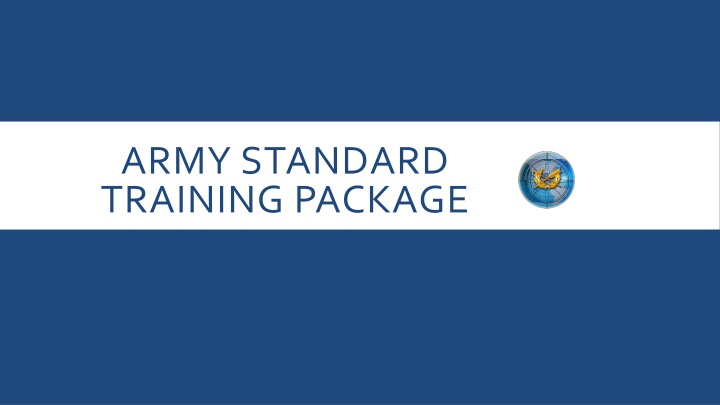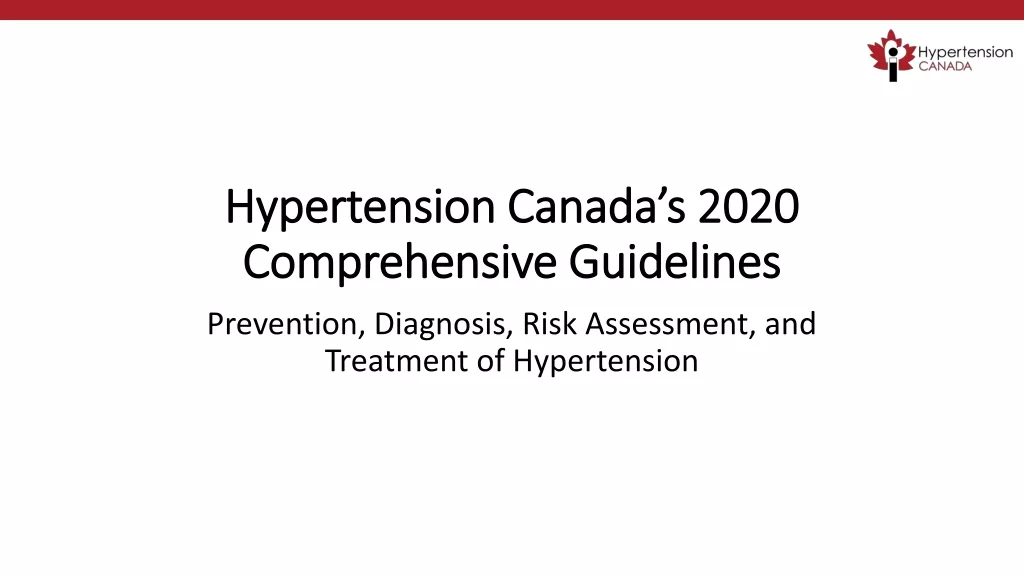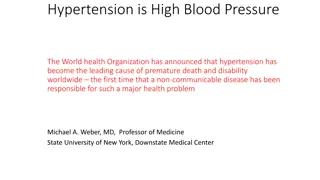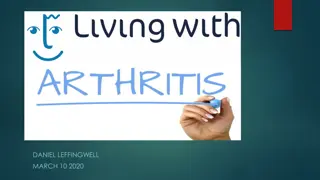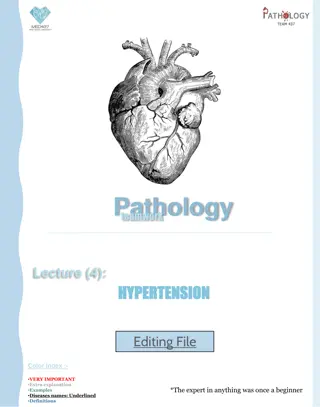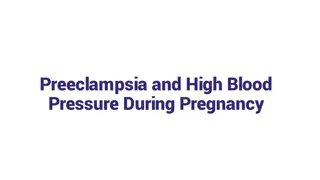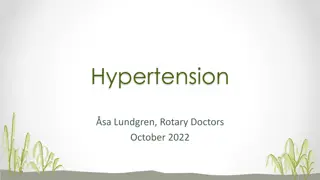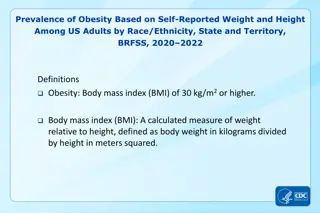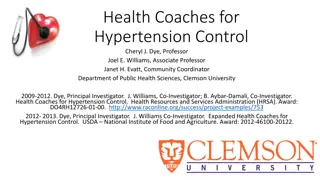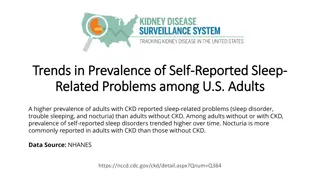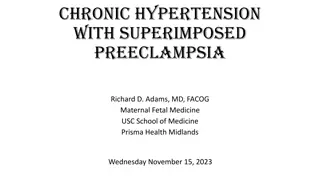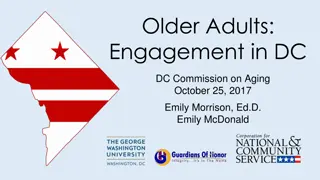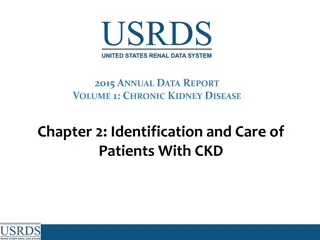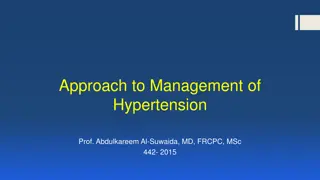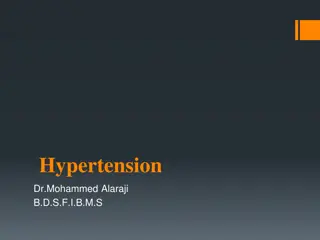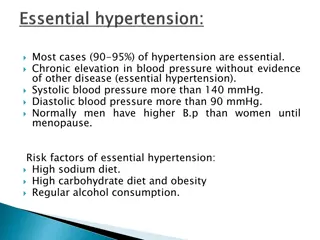Prevalence of Hypertension among Adults in Kpansia Community: The Need for Paradigm Shift in Prevention and Control
Hypertension, a prevalent cardiovascular disease, poses significant health risks worldwide. This study in Kpansia, Nigeria, highlights the importance of understanding its prevalence, awareness levels, and gender differentials to enhance prevention strategies.
Download Presentation

Please find below an Image/Link to download the presentation.
The content on the website is provided AS IS for your information and personal use only. It may not be sold, licensed, or shared on other websites without obtaining consent from the author.If you encounter any issues during the download, it is possible that the publisher has removed the file from their server.
You are allowed to download the files provided on this website for personal or commercial use, subject to the condition that they are used lawfully. All files are the property of their respective owners.
The content on the website is provided AS IS for your information and personal use only. It may not be sold, licensed, or shared on other websites without obtaining consent from the author.
E N D
Presentation Transcript
ARMY STANDARD TRAINING PACKAGE
ETHICS TRAINING Name Location/phone # Email address
ETHICS QUESTIONS? Contact your ethics official before you act. Current as of 28 October 2024
WHY ETHICS RULES? Ensure we perform our mission with public interest in mind. Uphold public s confidence in integrity of Government. Current as of 28 October 2024
KEY LAWS AND REGULATIONS 14 Principles of Ethical Conduct (The Code of Ethics) Standards of Ethical Conduct for Executive Branch Employees 5 C.F.R. Part 2635 Supplemental Standards of Ethical Conduct for Employees of the Dept. of Defense 5 C.F.R. Part 3601 The Joint Ethics Regulation (JER), DoD 5500.07-R (May 15, 2024) 18 U.S.C. 203, 205, 207, 208, 209 Current as of 28 October 2024
DISCUSSION TOPICS What forms the Ethics Rules and the Code of Ethics 14 Principles Use of Government Resources Use of Official Position Gifts Family Readiness Groups Official and Personal Participation in Nonfederal Entities and Private Organizations Seeking Employment Outside the Government Post-Government Employment Current as of 28 October 2024
CODE OF ETHICS 14 PRINCIPLES OF ETHICAL CONDUCT 1. Place public service above private gain 8. Act impartially, no preferential treatment 2. Financial interests may not conflict with official duties 9. Protect and conserve government property and only use it for authorized purposes 3. Do not use non-public info to further private interests 10. No outside employment or job hunting that conflicts with Federal job 4. No gifts from prohibited sources 11. Disclose waste, fraud, and abuse 5. Employees must put forth honest effort in performance of duties 12. Satisfy civic obligations. 6. No unauthorized promises purporting to bind the government 13. Uphold EEO laws and regulations 14. Avoid appearance of unethical conduct/violating the law or ethics regulations 7. Do not use public office for private gain Current as of 28 October 2024
EMPLOYEES RESPONSIBILITIES UNDER EXECUTIVE ORDER 12674 (AS AMENDED): DO Place loyalty to the Constitution, the laws, and ethical principles above private gain. Act impartially to all groups, persons, and organizations. Give an honest effort in the performance of your duties. Protect and conserve Federal property. Disclose fraud, waste, and abuse, and corruption to appropriate authorities. Fulfill in good faith your obligations as citizens, and pay your Federal, State, and local taxes. Comply with all laws providing equal opportunity to all persons, regardless of their race, color, religion. Current as of 28 October 2024
EMPLOYEES RESPONSIBILITIES UNDER EXECUTIVE ORDER 12674 (AS AMENDED) (CONT): DO NOT Use nonpublic information to benefit yourself or anyone else. Solicit or accept gifts from persons or parties that do business with or seek official action from DOD (unless permitted by an exception). Make unauthorized commitments or promises that bind the Government. Use Federal property for unauthorized purposes. Take jobs or hold financial interests that conflict with your Government responsibilities. Take actions that appear illegal or unethical. Current as of 28 October 2024
USE OF GOVERNMENT RESOURCES Rule: DoD Personnel may use Federal Government resources, including personnel, equipment, and property, for official purposes only, except as otherwise permitted in the JER or other applicable authority. Government property includes: Real property, computers, government vehicles, phones, scanners, copy machines, office supplies Services of contractor personnel, internet service, email address Limited personal use allowed under certain circumstances. Current as of 28 October 2024
USE OF OFFICIAL TIME Rule: Use official time in an honest effort to perform official duties. Remember: Your time is a Government Resource! Current as of 28 October 2024
USE OF PERSONNEL Rule: Do not ask subordinates to perform tasks outside their official duties. Subordinates official time is only for official duties or authorize purpose. Current as of 28 October 2024
USE OF GOVERNMENT TITLE Rule: An employee shall not use or permit the use of his or her Government position, title, or any authority associated with his or her public office to endorse any product, service, or enterprise. Rule: DoD Personnel are prohibited from using their official position or public office for personal financial gain, for the endorsement of any product, service, or enterprise, or for the private gain of friends, relatives, or persons with whom the DoD Personnel is affiliated in a non-government capacity. Current as of 28 October 2024
COMMON MISUSE ISSUES Thank-you letters, letters of recommendation, Star Notes Hiring subordinates at market rate Impartial access = endorsement Side hustle investing, managing rental property, spouse s business Government postage holiday cards, overseas shipping Fundraising in the workplace access, endorsement, solicitation Inappropriate influence fines & discounts Government vehicles & travel Solicitation from nonfederal entities holiday party, favors Contractor time & services Solicitation on behalf of nonfederal entities fundraising, support, pledging the government Endorsements & encouraging attendance at nonfederal entity events Subordinate duties & time Coins Current as of 28 October 2024
USE OF GOVERNMENT RESOURCES SCENARIO: You have a Government travel card, which you normally use only when you are on official travel. On Sunday, however, your daughter calls from college to tell you that she needs a new laptop because her old one was destroyed when she jumped into the mosh pit. (She refuses to give you any further details.) You quickly purchase a new one on-line for $900, but since your credit card is at home, you use your Government travel card, knowing you will pay the bill when you get it. QUESTION: Since this is no cost to the Government, it is ok, right? Current as of 28 October 2024
POSSIBLE ANSWERS 1. It is ok as long as you pay the travel card bill on time. The Department will never know. Actually, it s a benefit to the Department since it reaps the "points" from use of the travel card. 2. No, it is not ok, but don t worry because the Inspector General will not investigate any expenditure under $1,000. 3. No, the travel card may not be used for any personal expenses. Current as of 28 October 2024
CORRECT ANSWER #3. The travel card may be used only for travel- related expenses while you are performing official travel. Current as of 28 October 2024
USE OF YOUR OFFICIAL POSITION SCENARIO: You are in charge of the Tri-Service Interoperability Task Force. The Task Force includes personnel from all three Military Departments, as well as DoD Civilian employees. You believe that Task Force personnel would be effective if they joined the Association of the U.S. Army (AUSA),a nonfederal organization that frequently deals with topics of interest to the Task Force. To join, employees would have to sign up in their personal capacities and pay membership fees. You assign a member of your staff to distribute AUSA flyers to the Task Force and to give you periodic reports on who has joined. QUESTION: Have you done anything wrong? Current as of 28 October 2024
POSSIBLE ANSWERS 1. Yes. Although membership in AUSA by Task Force personnel would help it to accomplish its mission, requiring periodic reports on who had become an AUSA member suggests that you are coercing Task Force personnel to join AUSA. 2. Yes. Asking your staff to distribute AUSA flyers to the Task Force and to give you periodic reports on who had become an AUSA member suggests that you are endorsing a nonfederal entity and coercing your staff to join AUSA. 3. No. There is an exception for using your official position to promote the activities of nonfederal entities when it helps accomplish the mission. Current as of 28 October 2024
CORRECT ANSWER #2. Yes. Asking your staff to distribute AUSA flyers to the Task Force and to give you periodic reports on who had become an AUSA member suggests that you are endorsing a nonfederal entity and coercing your staff to join AUSA. Current as of 28 October 2024
Use of Your Official Position SCENARIO: You volunteer for Help the Teachers, a nonprofit civic group that provides counseling to public school teachers to help them cope with the stresses of their profession. The group will distribute flyers to advertise its upcoming fundraising dinner. The fundraising chairman proposes to include your name as a volunteer on some of the flyers, describe your contribution, and refer to your Government position (Deputy Director, Zero Emission Fuels Development, U.S. Office of Stealth Transportation). QUESTION: May you consent to the use of your Government title on the flyers? Current as of 28 October 2024
POSSIBLE ANSWERS 1. Yes. Help the Teachers is a nonprofit organization in the service of a worthy cause. Although the general rule is that you may not use your official position to promote the activities of nonfederal entities, there is an exception for nonprofit entities that serve a worthy cause, since the purpose of Government is to promote the general welfare of the people. 2. No. The general rule is that you may not use your official position to promote the activities of nonfederal entities. There are no exceptions. 3. No. The general rule is that you may not use your official position to promote nonfederal entities. There are exceptions, but none that apply here. Current as of 28 October 2024
CORRECT ANSWER #3. There are a few, very narrow exceptions to the rule against using your official position to promote the activities of nonfederal entities, but none apply to Help the Teachers. Exceptions: 1. Combined Federal Campaign 2. Military Relief Societies 3. Emergency and disaster appeals approved by Office of Personnel Management. 4. Organizations composed primarily of agency employees or their dependents, under certain circumstances Current as of 28 October 2024
USE OF YOUR OFFICIAL POSITION SCENARIO: As the Recreation Officer at Fort Morly, you are responsible for all recreational facilities on post. A local private school asks permission to use the post basketball court for a championship game. You would like to say "yes. Such use would be in the Department s community relations interests, but you know that if you approve their request, it will encourage other youth and civic groups in the community to request use of the athletic facilities, and you will be unable to accommodate all their requests. QUESTION: What should you tell the private school? Current as of 28 October 2024
POSSIBLE ANSWERS 1. Yes, it may use the basketball court. Supporting the private school s championship game would meet two of the three criteria for approval, in that it would not interfere with the performance of official duties and would be in the Department s community relations interests. As long as a majority of the criteria are satisfied, and the end result benefits the Department, you may approve the use of the court. 2. No, it may not use the basketball court. You know that you will be unable to accommodate requests for support for comparable events of other similar youth and civic groups. 3. No, it may not use the basketball court. The private school charges a substantial tuition and is open only to those students who can pay it. Public funding may not be used for the benefit of private groups. Current as of 28 October 2024
CORRECT ANSWER #2. You may only support the private school s championship game if the support meets all of the criteria in the general rule. Here, one of the criteria is not met because you will be unable to accommodate other requests for support for comparable events of other similar youth and civic groups. Current as of 28 October 2024
GIFTS Current as of 28 October 2024
FOCUS ON GIFTS First, what is a gift? Second, are there any specific items that are not gifts? Third, what are the rules governing the acceptance of gifts from specific sources? Lastly, if you are given a gift that you cannot keep, what are your alternatives? Current as of 28 October 2024
WHAT IS A GIFT? A gift is almost anything of monetary value, be it tangible item or a service. Current as of 28 October 2024
WHAT IS NOT A GIFT? Modest items of food and non-alcoholic refreshments. Prizes in contests open to the public. Greeting cards and items of little intrinsic value. Commercial discounts. Current as of 28 October 2024
GENERAL RULE An employee shall not solicit or accept, directly or indirectly, a gift from a prohibited source or a gift given because of the employee s official position. Current as of 28 October 2024
TYPES OF GIFTS Gifts from Outside Sources Gifts from Foreign Governments Gifts Between Employees Current as of 28 October 2024
WHAT IS AN OUTSIDE SOURCE? 1. Prohibited Source Seeking Government action Does business or seeks to do business with the Government Conducts activities regulated by the Government Interests substantially affected by Government agency 2. Because of Official Position Current as of 28 October 2024
OUTSIDE SOURCES THE METHOD OF ANALYSIS: 1. Would a reasonable person with knowledge of the relevant facts question the employee s integrity or impartiality as a result of accepting the gift? 2. If not, is the item actually a gift (exclusions)? 3. If so, is there an exception? Current as of 28 October 2024
Outside Sources First Question: THRESHOLD QUESTION (1) Every employee has a fundamental responsibility to the United States and its citizens to place loyalty to the Constitution, laws, and ethical principles above private gain. An employee s actions should promote the public s trust that this responsibility is being met. For this reason, employees should consider declining otherwise permissible gifts if they believe that a reasonable person with knowledge of the relevant facts would question the employee s integrity or impartiality as a result of accepting the gift. Current as of 28 October 2024
OUTSIDE SOURCES FIRST QUESTION: (2) An employee who is considering whether acceptance of a gift would lead a reasonable person with knowledge of the relevant facts to question his or her integrity or impartiality may consider, among other relevant factors, whether: (I) The gift has a high market value; (ii) The timing of the gift creates the appearance that the donor is seeking to influence an official action; (iii) The gift was provided by a person who has interest that may be substantially affected by the performance or nonperformance of the employee s official duties; and (iv) Acceptance of the gift would provide the donor with significantly disproportionate access. Current as of 28 October 2024
OUTSIDE SOURCES SECOND QUESTION: Is it a Gift? Is it something with monetary value? If it is a gift, are there any exclusions? Current as of 28 October 2024
OUTSIDE SOURCES THIRD QUESTION: Do the rules provide an exception permitting acceptance of the gift? Gifts of $20 or less ($50 max for year) Gifts based on personal relationship Discounts and similar benefits Exceptions for Enlisted Personnel E-6 and Below Current as of 28 October 2024
GIFT DISPOSAL If you cannot accept the gift, what should you do? Just say NO (Refuse or return the item) Pay for it (fair market value) If tangible item is <$100 you may now destroy it If perishable (with Supervisor or EC approval) Give it to charity Share within office Destroy it Current as of 28 October 2024
GIFTS FROM OUTSIDE SOURCES SCENARIO: You attend an information meeting hosted by a contractor. As you walk in you are greeted by a table of delicate pastries and the smell of fresh coffee brewing. QUESTION: May you eat the pastries and drink the coffee? Current as of 28 October 2024
ANSWER YES. The intention of the donor is for the pastries and coffee to be a snack and refreshment -- not a meal. The modest food item are excluded from the definition of a gift. Current as of 28 October 2024
GIFTS FROM OUTSIDE SOURCES SCENARIO: The next month, you once again attend an information meeting hosted by the same contractor. However, since the meeting is near the lunch hour, the contractor offers sandwiches, chips, and drinks instead of pastries and coffee. The value of the items is $15. QUESTION: May you enjoy the food? Current as of 28 October 2024
ANSWER YES. The meal is considered a gift from any outside source. Though the donor intends the sandwich as a meal, you may accept so long as you abide by the $20/$50 rule for this specific outside source. Current as of 28 October 2024
GIFTS FROM OUTSIDE SOURCES SCENARIO: You attend the same meeting hosted by the same contractor the next two months where you are offered and accept the fantastic sandwich meal you previously had for $15. On the fourth visit, you are offered a meal valued at $20. QUESTION: May you enjoy the meal offered at this meeting? Current as of 28 October 2024
POSSIBLE ANSWERS 1. YES. The value of the meal does not exceed $20. Eat and Enjoy! 2. YES. Though the aggregate value of the gifts from this specific contractor now totals $65, I can pay $15 so as not to exceed the $50 annual maximum. 3. NO. Accepting this fourth meal would exceed the $20/$50 rule. I must politely decline or pay the full market value of the meal. 4. YES. If I control myself and eat only a quarter of the meal, I will not exceed the $50 limit. Current as of 28 October 2024
CORRECT ANSWER #3 is Correct! NO you may not accept this fourth meal as it would exceed the $20/$50 rule. You should politely decline or pay the full market value of the meal. Current as of 28 October 2024
GIFTS FROM FOREIGN GOVERNMENTS NO SOLICITATION of gifts. Whenever possible, gifts from foreign governments shall be declined. Current as of 28 October 2024
GIFTS FROM FOREIGN GOVERNMENTS TWO EXCEPTIONS: 1. Individual may accept a gift of minimal value (retail value in U.S. at time of acceptance of $480 or less) Must aggregate: Multiple gifts from donor at a single presentation Gift to spouse is a gift to the service member 2. Individual may accept gifts on behalf of the U.S. Government that become the property of the U.S. Government upon acceptance. Current as of 28 October 2024
GIFTS FROM FOREIGN GOVERNMENTS Question: You are part of a U.S. delegation visiting the nation of Green Mountain. At 1000 on Tuesday, an official of the Green Mountain Government presents you with a silver tea set that has a U.S. retail value of $250. At 1600 that same day, but at a different ceremony, the same official presents you with a crystal vase that has a U.S. retail value of $300. The head of the delegation told you in advance that if offered any gifts you should accept to avoid embarrassment. So you accepted both the tea set and the vase. May you keep the gifts? Current as of 28 October 2024
POSSIBLE ANSWERS 1. YES. Though the aggregate value of the gifts is $550, I can pay the difference between the retail value of the gift and the minimal value of $480. 2. NO. The aggregate retail value of the gifts exceeds the $480 minimal value and, therefore, the gifts must be accepted on behalf of the U.S. Government and become property of the U.S. Government upon acceptance. 3. YES. The minimal value refers to the aggregate of all gifts made at the same presentation by the same donor. Thus, because these gifts were offered at two separate presentations, they do not exceed the minimal value. Current as of 28 October 2024
